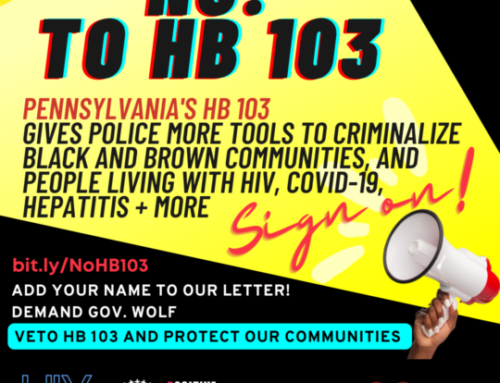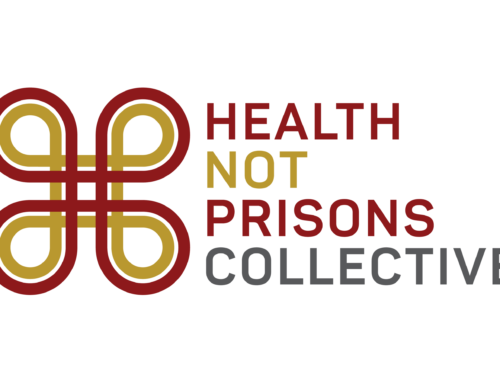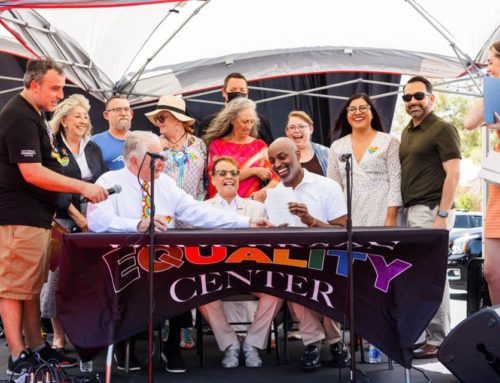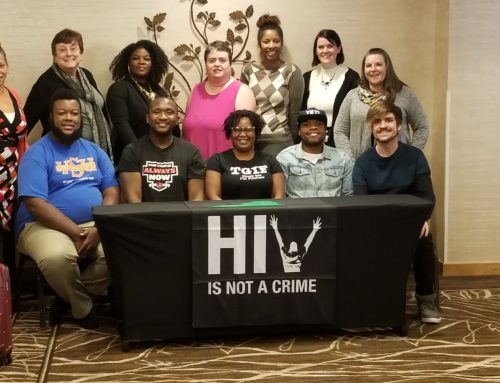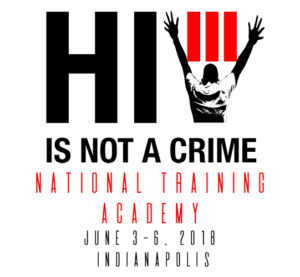
Updated January 8, 2018: The HIV Is Not a Crime Training Academy unites and trains advocates living with HIV and allies from across the country on laws criminalizing people living with and vulnerable to HIV and on strategies and best practices for repealing such laws. The third HIV Is Not a Crime Training Academy will be held on the campus of Indiana University-Purdue University in Indianapolis, Indiana, June 3-6, 2018.
A limited number of scholarships are available. The deadline to submit your application for a scholarship is Friday, January 12, by 5pm EST/2pm PST. All scholarship applications must be submitted through the online form available in English here and in Spanish here. Please make sure to read the instructions carefully and submit any questions you may have to conference@seroproject.com. Only complete applications will be considered. An organization or individual you have worked with on HIV advocacy will also need to submit a letter of support for your application by 5pm EST Friday, January 12, in order for your application be considered complete.
Interested in presenting at HIV Is Not a Crime III?
The call for session proposals is now open! We held with an informational webinar Monday, Jan. 8–you can watch the recording here. The webinar explains the abstract submission process, scoring criteria, timeline and helpful tips. All people interested in submitting an abstract who missed the webinar are strongly encouraged to watch the recording. If you still have questions after watching the webinar recording, please email conference@seroproject.com.
Submission Guidelines
Download the HIV Is Not a Crime III Submission Guidelines in PDF format here
Submission Process Timeline:
Session abstracts may be submitted from Jan 8- Feb 12, 2018.
Accepted abstracts will be announced on April 9, 2018.
HIV Is Not A Crime program and agenda will be finalized April 25, 2018.
Important Things to Consider Before Submitting:
- All proposals must include at least one person living with HIV as a presenter or a co-facilitator to be considered for selection.
- All presenters are required to register for the conference or apply for a scholarship; acceptance of a proposal does not guarantee a scholarship or coverage of registration or travel expenses.
Workshops selected will help advance informed and effective grassroots organizing and coalition-building providing participants with concrete tools and resources to work on state-level strategies when they return home.
After reviewing proposals, conference organizers may invite session organizers to collaborate on a session.
Tracks:
There will be three session tracks at HINAC:
- Effective and Accountable Leadership
- This track will focus on building relevant and current leadership skills for an effective and intersectional criminalization movement.
- Sessions considered may include coalition-building, development of individual leadership skills or emphasize centering disproportionately impacted communities.
- Rights, Policy and Justice
- This track will focus on policy issues, criminal justice, and advocacy strategies relevant to disproportionately criminalized communities.
- Submissions on issues specific to communities targeted by policing practices due to race, gender identity, sexual orientation, substance use, immigration status, and other forms of discrimination are encouraged.
- Campaign Planning, Strategy and Messaging
- This track will provide resources, tools and skills advocates need to successfully develop and implement a state-level campaign to repeal or modernize criminalization laws.
- Submissions may focus on the “nuts-and-bolts” required for organizing, including messaging research and positioning, how to best utilize research to persuade media, policy leaders and legislators and creation and execution of a campaign plan.
We expect to receive more breakout session proposals than we can accommodate. When making selection decisions, we have many considerations to balance, including our desire to elevate diverse leadership and new organizations and voices into the mix at each Training Academy.
Please read the criteria below for what we are and are not looking for:
Workshops we ARE looking for:
- Participatory: Interactive, with mutual communication amongst participants and between participants and presenters, and with hands-on engaging activities.
- Timely: Demonstrates an understanding of current socio-political, criminal justice, policing, and criminalization environment
- Intersectional: Demonstrates an intersectional analysis
- Practical: Provide participants with useful tools, including innovative strategies, exemplary models, powerful narratives, and accessible artistic and cultural expressions.
- Action-Oriented: Session connects to active issue campaigns, grassroots community organizing, and current struggles and/or movement building efforts.
- Intergenerational: The content is relevant to, and encouraging of, the participation of youth and young people, as well as multi-generational strategies.
- Geographic Diversity: For national audience, we want the content and facilitators to relate to different geographic areas, especially the South.
- Multiracial: Sessions include a multiracial and intersectional analysis and approach — even if there is a mono-racial emphasis. A multiracial team of facilitators is also encouraged.
- People first language: Language matters. We are asking that all proposals use people first language, which centers people’s dignity rather than stigmatizing them.
Workshops we ARE NOT looking for:
- Lectures, presentations of academic papers or mostly theory, or panels that primarily involve people talking at others.
- Sessions that do not have a connection to people working in local communities.
- Sessions that focus primarily on a problem, without equal or greater attention given to proposed solutions.
- Sessions by individuals not engaged with, connected or accountable to social justice organizations or communities.
We strongly encourage applicants to consider formats that engage participants, rather than simply presenting information. In addition, the program committee will review overall workshop acceptances with an eye towards diversity of presenters, particularly in demographics, geography, skills, and expertise.
Workshop submissions will be reviewed and evaluated by a volunteer Program Work Group on the following criteria:
1) Alignment with track description and Training Academy goals and guiding principles
2) Clarity of description
3) Appropriateness of suggested format
Applicants may submit up to two workshops for consideration. For each 90-minute workshop, applicants should follow the suggested format below. There is no limit to the number of total presenters on a workshop.
Each proposal must include the following:
- First and last name of lead presenter(s)
- First and last name of additional presenter(s)
- Email address and phone number of lead presenter
- Title and organization affiliation, if any, for each presenter
- Workshop track
- Proposed workshop title
- Workshop description
- Workshop objectives
- Format of workshop (describe how you and/or presenter(s) will conduct the workshop, i.e. presentation style, opportunity for discussion and/or interactive activities/exercises)
- Identify if your workshop is for
- Beginner: workshop does not require attendees to have prior knowledge of subject matter to be covered in the session
- Intermediate: workshop requires attendees to have some foundational knowledge of subject matter to be covered in the session
- Or Advanced attendees: workshop requires attendees to have high level science, case law, policy or program implementation knowledge
- A short bio (25 words) for each presenter
- A photo of each presenter submitted to: conference@seroproject.com
Submit your proposal in Spanish here



